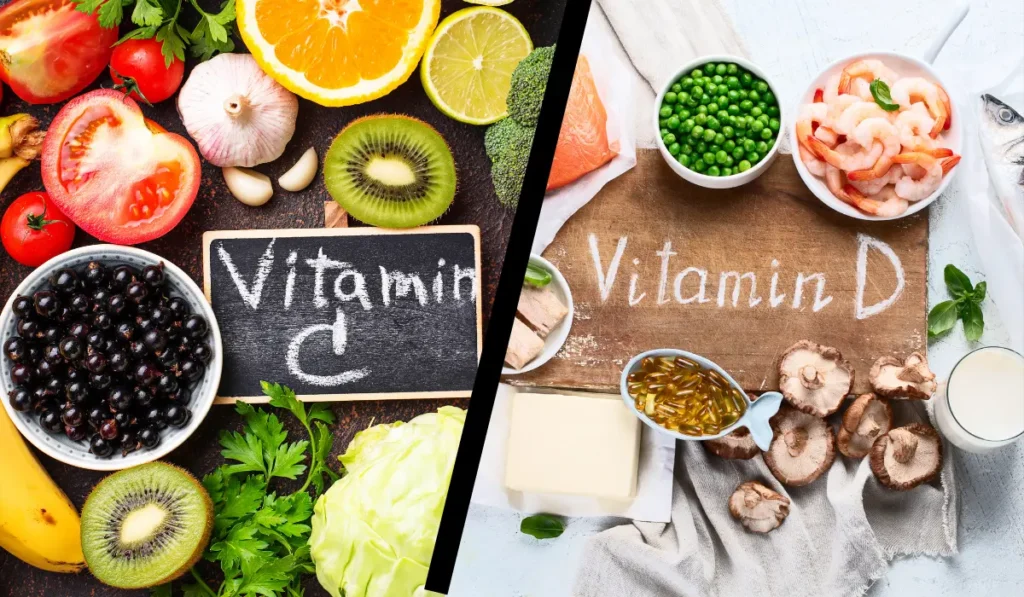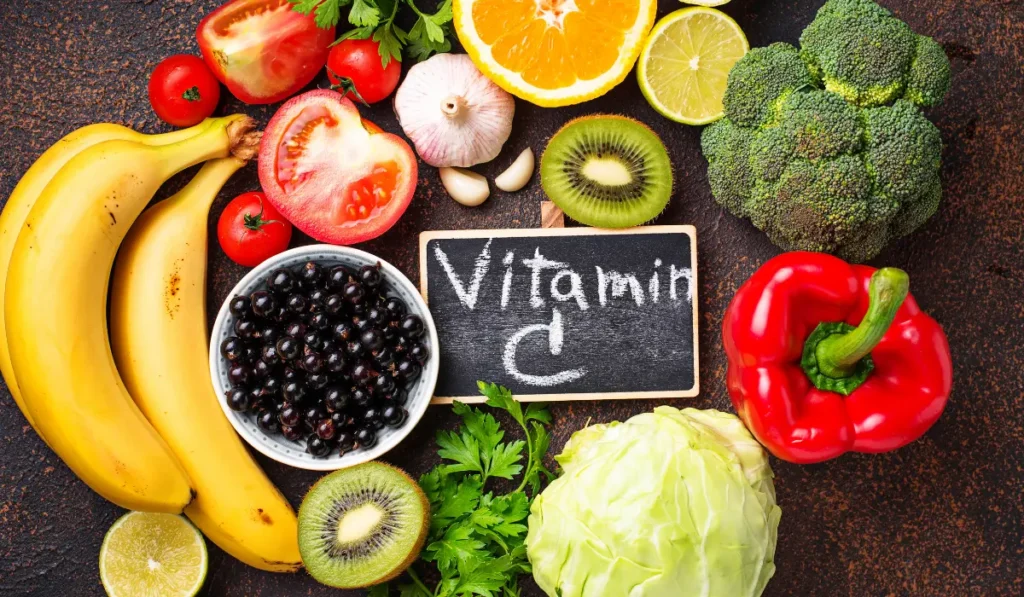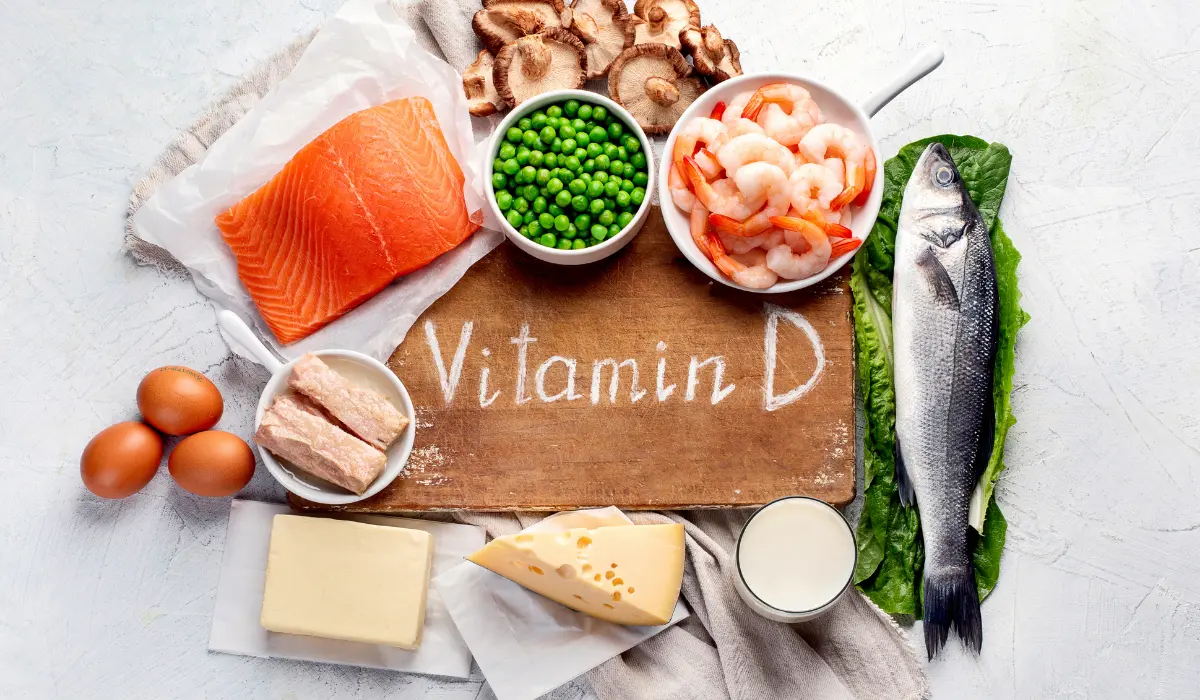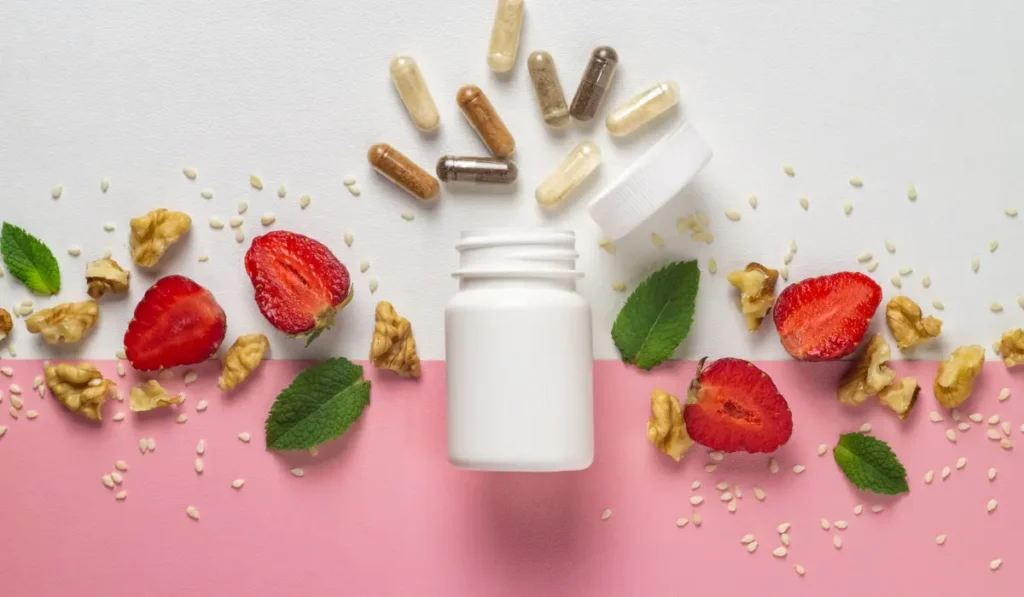The COVID-19 pandemic has shown us how vital a strong immune system is. Vitamins C and D are key nutrients that help our bodies fight off diseases. In this article, we’ll look at how these vitamins can boost your health and immunity. This will help you stay strong during tough times.
Sarah, a busy mom, always focused on eating well. But during the pandemic, it was hard for her to keep up. “I felt tired and got sick more easily,” she said. “That’s when I started learning about vitamins C and D.”
Sarah’s story is familiar to many. Vitamin C deficiency is common in the US. Vitamin D lack is linked to more infections and diseases.
Learning about vitamins C and D can help you strengthen your immune system support and health. They help with skin health and can lessen the impact of COVID-19 and other respiratory infections. These vitamins are your body’s allies in staying healthy and strong.
Introduction to Vitamins C and D
Vitamins are key nutrients that help keep us healthy. Vitamins C and D are especially important. Each has its own role and benefits.

Vitamin C: The Antioxidant Powerhouse
Vitamin C, also known as ascorbic acid, is a water-soluble vitamin. Our bodies can’t make it, so we need to eat it. It’s vital for a strong immune system, healing wounds, and fighting off infections.
It also acts as a strong antioxidant. Vitamin C protects cells from damage and reduces inflammation. This helps prevent and manage many diseases.
Vitamin D: The Sunshine Vitamin
Vitamin D is a fat-soluble vitamin. We get it mainly from sunlight. It’s key for strong bones and a healthy immune system.
This vitamin helps our immune system work right. It affects how immune cells like T-cells and B-cells function. Not having enough Vitamin D can lead to more infections and diseases.
Both vitamins C and D are vital for our health. Eating a balanced diet is best, but supplements can help too. They’re good for those who need more or have deficiencies.
Always talk to a doctor before taking supplements. They can help find the right amount and check for any drug interactions. Getting enough of these vitamins boosts our immune system, bones, and overall health.
Role of Vitamin C in Immune Function
Vitamin C, also known as ascorbic acid, is key for a strong immune system. It helps immune cells like neutrophils, lymphocytes, and phagocytes work better. It also boosts the making of antibodies.
Vitamin C is a strong antioxidant too. It guards your cells from oxidative stress and lowers inflammation. This helps fight off many infectious diseases.
- Vitamin C deficiency makes you more likely to get sick.
- Too much vitamin C doesn’t really help the immune system in healthy people.
- But, vitamin C given through an IV might help with serious lung problems and critical illnesses.

“Vitamin C supports the immune system by enhancing the function of various immune cells and promoting the production of antibodies.”
The antioxidant properties of vitamin C protect cells and cut down inflammation. This is vital for a healthy immune system and fighting off diseases.
Knowing how vitamin C helps the immune system is important. Make sure you get enough from food or supplements. This supports your health and well-being.
Vitamin C and Respiratory Infections
Many studies have looked into vitamin C’s role in fighting off respiratory infections like the common cold and flu. They’ve found that vitamin C might help lessen the symptoms and shorten the time you’re sick.
Vitamin C and the Common Cold
Research shows vitamin C can cut down the time you’re sick with a cold by up to 8% in adults and 14% in kids. It also makes cold symptoms like coughing and sore throat less severe.
Vitamin C and the Flu
Vitamin C might also help prevent and treat the flu. Some studies say it could lower your chance of getting the flu. It can also ease flu symptoms like fever and muscle aches.
Vitamin C and Respiratory Infection Prevention
- Vitamin C is key for a strong immune system. It helps immune cells like neutrophils and lymphocytes work better.
- As an antioxidant, vitamin C protects cells from damage. This can help prevent and manage respiratory infections.
- People with more vitamin C in their blood are less likely to get respiratory infections like pneumonia.
In short, enough vitamin C, from food or supplements, can help keep your respiratory system healthy. It might also reduce the impact of common viral infections.
| Study | Findings |
|---|---|
| Carr et al. (2020) | Patients with community-acquired pneumonia had low vitamin C levels and high oxidative stress. This links vitamin C deficiency to pneumonia. |
| Myint et al. (2019) | Higher vitamin C levels in blood were linked to lower risk of respiratory diseases and death. Vitamin C seems to protect against these conditions. |
| Fowler et al. (2019) | Vitamin C infusion helped patients with sepsis and severe respiratory failure. It improved organ function and reduced inflammation. |
| Chiscano-Camón et al. (2020) | Vitamin C levels varied in patients with SARS-CoV-2-associated acute respiratory distress syndrome. This suggests vitamin C might play a role in COVID-19 outcomes. |
“Vitamin C is crucial for immunity and health. Studies show it can improve outcomes for respiratory infections.”
Vitamin D and Immune Regulation
Vitamin D is key in controlling the immune system. It affects how immune cells work, like T-cells, B-cells, and antigen-presenting cells. This vitamin is vital for a balanced immune system.

Vitamin D and Immune Cell Function
Vitamin D boosts the work of immune cells. This includes:
- T-cells: Vitamin D helps T-cells work better, which is important for cell immunity.
- B-cells: It aids in making antibodies by B-cells, key for the adaptive immune response.
- Antigen-presenting cells: Vitamin D affects these cells, crucial for starting and guiding the immune response.
Vitamin D keeps the immune system healthy. This is key for fighting infections and preventing autoimmune diseases.
Vitamin D Deficiency and Immune-Related Disorders
Many studies link vitamin D deficiency to immune problems. These include:
- Respiratory infections: Vitamin D deficiency raises the risk of upper and acute respiratory infections by 74% and 78%, respectively.
- Autoimmune diseases: People with autoimmune conditions like type 1 diabetes and rheumatoid arthritis often have lower vitamin D levels.
These findings show why vitamin D is crucial. It helps keep the immune system strong and lowers the risk of infections and autoimmune diseases.
“Vitamin D is essential for regulating the immune system and plays a crucial role in modulating both the innate and adaptive immune responses.”
In summary, vitamin D is vital for a healthy immune system. Getting enough vitamin D through sun, diet, or supplements helps fight infections and autoimmune diseases.
Vitamin C and D in COVID-19
Research has shown that vitamins C and D might help fight COVID-19. They could support the immune system and lessen symptoms. This is important to know during the pandemic.
Vitamin C and COVID-19
Studies have looked into vitamin C’s role in COVID-19. A 2022 review found that vitamin C given through an IV could help. It might reduce how severe COVID-19 gets and lower death rates.
A 2021 trial showed that high doses of vitamin C helped critically ill patients. This suggests vitamin C is key for immune support during COVID-19.
Vitamin D and COVID-19
Vitamin D research in COVID-19 is also growing. A 2021 study found a link between vitamin D levels and COVID-19 deaths in Europe. It shows vitamin D’s role in fighting the disease.
In Spain, over 80% of COVID-19 patients lacked vitamin D. Men were more likely to be deficient. This is worrying, especially for Hispanic and Black people in the U.S. They face higher COVID-19 risks.
Overall, vitamins C and D are important for immune health during COVID-19. But, we need more research to fully grasp their benefits.
Dietary Sources of Vitamin C and D
Eating a balanced diet with lots of vitamin C and D is key for your health and immune system. Sunlight is the main way we get vitamin D. But, there are also great foods that can help you get enough.
Vitamin C-Rich Foods
Vitamin C, also known as ascorbic acid, is found in many plant-based foods. Here are some of the best sources:
- Citrus fruits like oranges, grapefruits, and lemons
- Berries such as strawberries, raspberries, and blackberries
- Tomatoes and bell peppers
- Leafy green vegetables like kale, spinach, and mustard greens
- Broccoli and Brussels sprouts
These foods are not just full of vitamin C. They also have other good stuff that makes them great for a healthy diet.
Vitamin D Food Sources
While sunlight is the main way we get vitamin D, there are foods that help too. Here are some:
- Fatty fish such as salmon, tuna, and mackerel
- Egg yolks
- Fortified dairy products like milk and yogurt
- Mushrooms, especially shiitake mushrooms
Supplements can help if you’re not getting enough vitamin D. But, the Office of Dietary Supplements says it’s best to get vitamins and minerals from food whenever you can.
| Food | Vitamin C Content | Vitamin D Content |
|---|---|---|
| Kakadu Plums | 2,907 mg per 100g (484% DV) | N/A |
| Acerola Cherries | 825 mg per 1/2 cup (916% DV) | N/A |
| Salmon | N/A | 624 IU per 3 oz (78% DV) |
| Egg Yolks | N/A | 41 IU per large egg (5% DV) |
| Shiitake Mushrooms | N/A | 154 IU per 1/2 cup (19% DV) |
Eating a variety of foods rich in vitamin C and D can boost your health and immune system. Always talk to a doctor if you’re worried about getting enough nutrients or need advice on what to eat.
Vitamin C and D Deficiency
Keeping enough vitamins like vitamin C and D is key for health. But, many people worldwide don’t have enough. This has big effects on their health.
Vitamin C Deficiency: Scurvy and Beyond
Vitamin C shortage, or scurvy, causes serious problems. Symptoms include tiredness, weakness, bleeding gums, and slow healing. It’s a big issue, affecting millions, from 7.1% in the U.S. to 73.9% in northern India.
Foods like citrus fruits, potatoes, and spinach are full of vitamin C. But, not everyone gets enough. This can be due to diet, health issues, or not having access to good food.
Vitamin D Deficiency: A Global Epidemic
Vitamin D shortage is a big problem, affecting 1 billion people worldwide. In the U.S., about 35% of adults don’t have enough. It’s vital for strong bones and a healthy immune system.
Most people get vitamin D from the sun. But, foods like fatty fish and egg yolks help too. Your age, lifestyle, and health can affect how much vitamin D you have.
| Vitamin C Deficiency | Vitamin D Deficiency |
|---|---|
| – Affects millions globally – Prevalence ranges from 7.1% to 73.9% – Symptoms include fatigue, weakness, bleeding gums, and impaired wound healing | – Affects 1 billion people worldwide – 50% of global population has insufficiency – 35% of U.S. adults are deficient – Linked to bone loss, fracture risk, and immune system compromise |
Fixing these vitamin shortages is important. A good diet, supplements, and healthy habits can help. Talking to a doctor can help figure out what you need and how to get it.
Vitamin C and Skin Health
Vitamin C is a key player in keeping your skin healthy and young. It helps make collagen, a protein that keeps your skin firm and elastic. This makes your skin look plump, smooth, and bright.
Vitamin C also protects your skin from UV damage. It has photoprotective effects, which means it shields your skin from UV stress. This can prevent early skin aging and reduce damage like wrinkles and sunspots.
- The vitamin C content of the epidermis (outer layer of skin) is higher than the dermis (inner layer), with concentrations in both layers equal to other water-soluble antioxidants.
- Excessive exposure to UV light or pollutants can lower vitamin C levels in the skin, primarily in the epidermis.
- Oral vitamin C supplementation effectively increases the nutrient’s levels in the skin.
- Topical application of vitamin C can also penetrate the epidermis and reach the dermal layers.
Many studies have found that topical vitamin C is great for your skin. It can reduce wrinkles and improve skin texture and tone. Adding vitamin C to your skincare routine can make your skin look and feel better. Use it in serums, creams, or supplements to keep your skin healthy.
“Vitamin C is essential for the synthesis of collagen, a key structural protein in the skin. This makes vitamin C crucial for maintaining healthy, youthful skin.”
Vitamin C and Wound Healing
Vitamin C is key in wound healing by helping form collagen, a vital protein. Many studies show vitamin C helps wounds heal better in different situations.
Studies say up to 21.4% of adults in Australia might not get enough vitamin C. The amount needed changes with age, from 35mg/day for kids to 45mg/day for adults.
Research on vitamin C and wound healing is ongoing. One study found vitamin C helped reduce pressure ulcers by 84%. Yet, another study showed no big difference in healing rates with 500mg twice daily for 12 weeks.
But, some studies found vitamin C helped wounds heal faster and reduced pain. This was seen in dental extractions and foot ulcers.
The right amount of vitamin C for healing might vary. Still, eating right or taking supplements can help the body heal. Always talk to a doctor before starting vitamin C, as too much can harm.
Vitamin C and D Supplementation
Getting vitamins C and D from food is best. But, some people might need supplements. Vitamin C and vitamin D supplements can help meet needs, especially for those who can’t get enough from food.
About 8% of people worldwide lack vitamin C. In the U.S., 13% are short on vitamin C. Also, nearly 50% of U.S. adults don’t get enough vitamin C from food. For vitamin D, 29% of the U.S. population is lacking. And, 95% of Americans don’t get enough vitamin D from their diet.
The daily need for vitamin C is 65-90 mg. For vitamin D, it’s 15 mcg (600 IU) but can be 1500 to 2000 IUs for adults. Supplements can help reach these levels, especially for those with deficiencies.

Benefits of Vitamin C and D Supplementation
- Helps prevent acute respiratory infections and supports immune function
- Reduces the risk of mortality and length of hospital stay in critically ill patients
- Improves bone health and reduces the risk of falls and fractures
- May have potential benefits in managing sepsis and COVID-19
Vitamins C and D are usually safe. But, talk to a doctor before starting supplements. Too much can cause problems, and it might interact with medicines.
| Vitamin | Deficiency Rates | RDA | Potential Benefits of Supplementation |
|---|---|---|---|
| Vitamin C | 13% of U.S. population | 65-90 mg | Supports immune function, wound healing, and antioxidant protection |
| Vitamin D | 29% of U.S. population | 15 mcg (600 IU), up to 2000 IU for adults | Supports bone health, immune function, and may reduce mortality in critical illness |
“Vitamin D deficiency was highlighted as a global concern, with studies discussing its impact on health and disease.”
Vitamin C and D Interactions and Safety
Vitamins C and D are usually safe, but too much can cause problems. They might not work well with some medicines. Always talk to your doctor before taking new supplements.
Too much vitamin C can upset your stomach or even cause kidney stones. Vitamin D in high amounts can lead to too much calcium in your blood. This might make you feel sick or weak. These vitamins can also mess with medicines like blood thinners or steroids.
Try to get vitamins C and D from food first. If you need supplements, take them as your doctor says. Keep an eye on your nutrient levels and tell your doctor if anything changes. Knowing how these vitamins work together can help you stay safe and healthy.
FAQ
What are the benefits of vitamin C and D for health and immunity?
Vitamin C is key for a strong immune system and healing wounds. It also fights off harmful free radicals. Vitamin D is vital for strong bones and a healthy immune system.
How do vitamins C and D support the immune system?
Vitamin C boosts the work of immune cells and helps make antibodies. It also protects cells from damage. Vitamin D helps control the immune system’s response to threats.
Can vitamin C help prevent and treat respiratory infections?
Yes, research shows vitamin C might help fight off colds and flu.
How does vitamin D affect immune function?
Vitamin D is important for the immune system. Not having enough can lead to infections and autoimmune diseases.
Can vitamins C and D help with COVID-19?
Some studies suggest vitamins C and D might help with COVID-19 by boosting the immune system and easing symptoms.
What are the best dietary sources of vitamin C and D?
Foods rich in vitamin C include citrus fruits, berries, and leafy greens. For vitamin D, eat fatty fish, egg yolks, and fortified foods. Sunlight is also a great source.
What are the consequences of vitamin C and D deficiency?
Not enough vitamin C can cause scurvy, leading to weakness and poor wound healing. Lack of vitamin D can harm bones and weaken the immune system.
How does vitamin C benefit the skin?
Vitamin C helps make collagen, keeping skin healthy. It also protects against sun damage.
Can vitamin C improve wound healing?
Yes, vitamin C is crucial for collagen production in wound healing. It has been shown to speed up healing in various studies.
When should I consider taking vitamin C and D supplements?
If you can’t get enough from food, supplements might help. They’re especially useful for those with deficiencies.
Are there any safety concerns with taking high doses of vitamin C and D?
While vitamins C and D are safe, too much can cause problems. Always talk to a doctor before taking high doses, especially if you’re on medication.